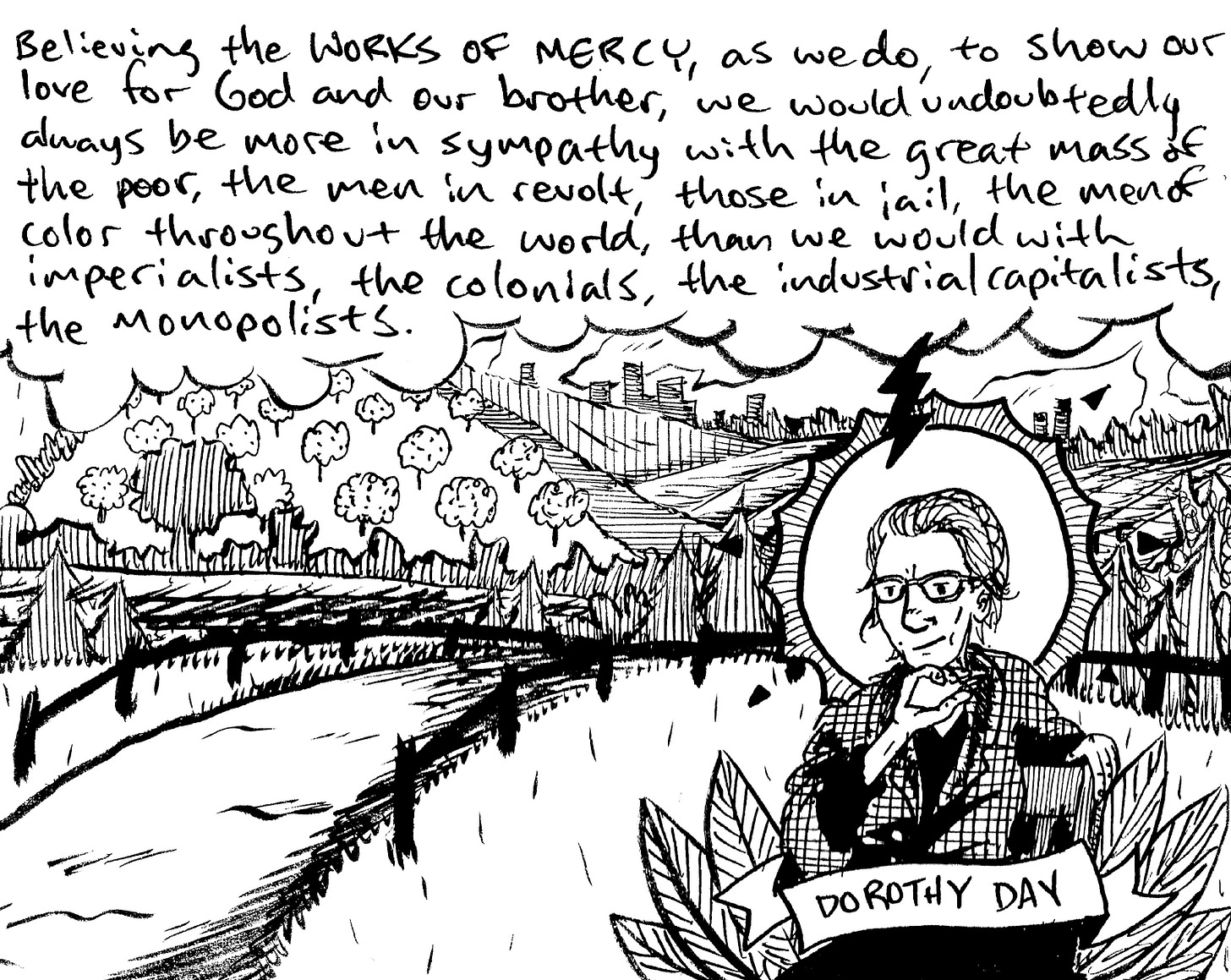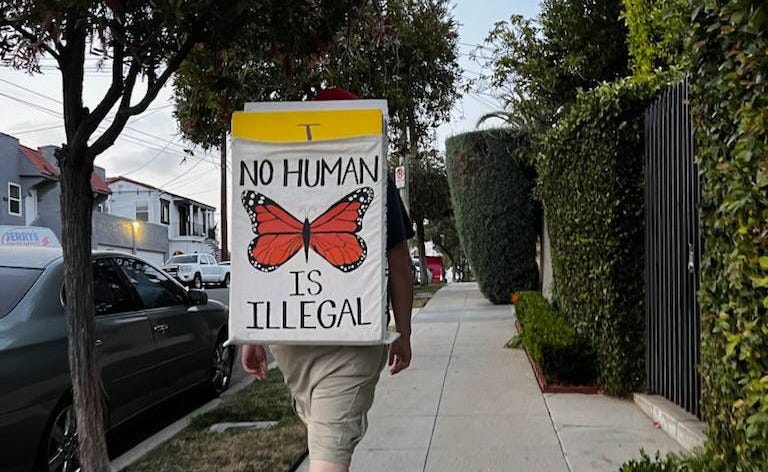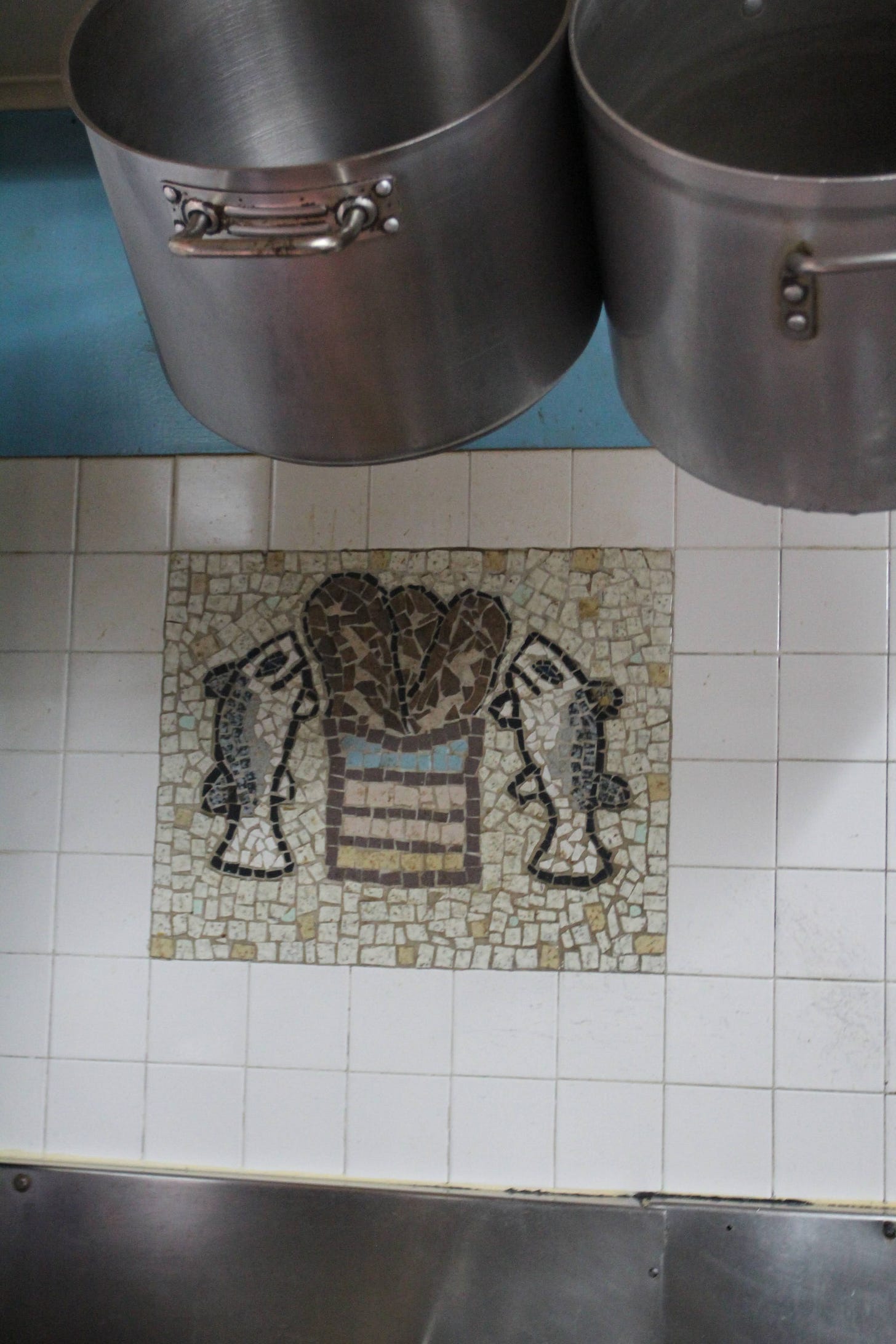"We must be ready for the long haul"
Inside: Catholic Workers on immigration, resistance, hospitality and more.

Body of Christ
The above comic by Joshua Dease is a powerful articulation of Dorothy Day’s theology (her words are from a March 1957 column in The Catholic Worker).
Simply put, the Catholic Worker (who she means by “we”) are more in sympathy with those who have no social capital, the poor, the uneducated, the marginalized, the sick, the hungry, because they are Christ.
It is a very simple doctrine that offers a simple—if difficult—program to follow. Harry Murray, in our series from his book “Do Not Neglect Hospitality” observes the tension between principles and daily actions or routines of a community. But he also examines the gift that these principles of personalist commitment to the works of mercy can be to Workers and guests.
Sr. Donna Del Santo, below, shares a story of a grim scene while visiting immigration court. There, as in so many courts throughout the United States, the truth that the poor, the refugee, are Christ is denied. Rather than visiting Christ in prison, Christ is imprisoned.
On Friday, Michael Pham, the bishop-elect of San Diego, the first bishop Pope Leo XIV has appointed in the United States, entered an immigration court in San Diego with several priests. Several outlets reported that their presence caused the ICE agents assembled to scatter. Perhaps, the presence of the clergy, who lift up the Body of Christ in the form of the bread and wine at Mass, lifted up the presence of Christ in the asylum seekers and immigrants in that courthouse.
On several different feasts of Corpus Christi, which the Catholic Church celebrates today, The Catholic Worker published a poem by James Rogan in the newspaper:
Beggars of God, we ask for bread
Will He give us a stone instead?
With honey of rock and fit of wheat
He fills us in the noon-day heat.
Bread that Is Life and blood of wine
Word of the Father in either sign.
Beggars all, at our Father’s door
Kneeling, we seek to be fed once more,
By Him who bids the hungry stay
And sends the empty rich away
As we wrote about last year, when Catholic Workers accompanied Martha Hennessy to the Eucharistic Congress in Indianapolis, the Body of Christ was at the center of Dorothy Day’s theology: the Christ who visits us in the “bread that is life” and the brother or sister suffering or in need who visits us with a knock on the door.
May we open the doors of our neighborhoods, our communities and our homes ever more joyfully in a holy hospitality to the Christ who knocks.
peace,
Renée
FEATURED
CW Reads: Harry Murray on the (Dis)Organized Works of Mercy
On Thursday, CW Reads (you can subscribe to this series of long-form articles published throughout the week here or at the end of this email) shared the third section of a chapter from Harry Murray’s “Do Not Neglect Hospitality.” Murray covers how Catholic Workers at St. Joseph’s House in New York City offered shelter and clothing to guests at St. Joseph’s and visit the sick near them. He offers a keen observation on the “intake process” for shelter:
On the other hand, a person could be told that "the house is full" even though beds were empty. When tensions in the house were running high and Workers felt they couldn't deal with the additional psychic burdens usually brought by a "wounded person" from the streets, the house was deemed full. This was usually done informally by discussions among several Workers rather than at the initiative of the person on the house.
Finally, and perhaps most importantly, the negotiation was affected by the way in which the guest presented himself or herself. The operative rule was "we already have enough permanent residents." The person most likely to gain shelter was someone who presented himself or herself as in need of shelter for only a limited time because he or she had a realistic plan for getting shelter elsewhere. Persons who were regulars at the soupline were not likely to be offered shelter, except perhaps for one night in an emergency. Those selected as guests tended to exhibit more middle-class attributes than "men on the line."
CW Reads: Sr. Donna says, “We must be ready for the long haul”
On Friday, CW Reads shared a reflection from Sr. Donna Del Santo, a Sister of Saint Joseph in Rochester, New York, who serves as the chairperson of Bethany House Catholic Worker and was a former live-in volunteer at St. Joseph House in Rochester. Sr. Del Santo shared a story of traveling to immigration court in Buffalo with a fellow sister:
We exited with the last person seen before the judge. He was Spanish-speaking, so I greeted him and wished him well, "¡Buena suerte. Vaya con Dios!
He went down the elevator ahead of us, and, when we arrived in the lobby, four persons, I presume from ICE, had him handcuffed and were taking him away. "Stop!" we shouted, "What are you doing? Who are you? Shame, Shame, Shame on you! What would your Mother say to you and this evil act?" They quickly pulled him behind a door that said “Restricted”, not before he looked at us with his pleading eyes that said, Help!
Now it's really personal, not just something I saw online or on the news! I asked the guard in the lobby, who is not a police officer or federal agent, "Has this been happening all day?" He said, “I'm not really able to say, but read between the lines."
COMMUNITY NEWS & NEWSLETTERS
Ithaca Catholic Worker Hosts Sixteenth Annual Peter De Mott Peace Trot
The Ithaca Catholic Worker community held its 16th annual Peter DeMott Peace Trot on Sunday, Father’s Day. Peter DeMott was a Catholic Worker community member who died tragically in a work-related accident in 2009. Read more about it and see photos from the 5K and one-mile run events on Facebook.
Bishop Prays at London Catholic Worker Vigil
Bishop Paul McAleenan, an auxiliary bishop of the Diocese of Westminster, joined the London Catholic Worker community on June 16 for our Vigil outside the Home Office, in commemoration of Refugee Week 2025.
“As always, we mourn for those who have lost their lives on the European borders trying to reach a place of safety in Europe and the UK,” the community wrote, “and we pray for genuine humanitarian policies on asylum and immigration.”

CatholicWorker.org Seeks Volunteers
We’re looking for volunteers to help do some “maintenance and cleaning” at CatholicWorker.org this summer, beginning in July. Our two main projects involve proofreading and correcting Dorothy Day’s writings and contacting Catholic Worker communities to update the community directory. We’ve received a good response so far, but are still accepting help. If you’re interested, complete one or both of the signup forms below:
CW IN THE MEDIA
Bay Area Catholic Worker Recognized for 29 Years of the Works of Mercy
CBS News Bay Area awarded its ICON Award to Peter Stiehler, the founder of Catholic Worker House of Hospitality in San Bruno. Stiehler was profiled in a local CBS news article announcing his award. “I wanted a way to live out my faith,” Stiehler said to CBS. Read the full article here.
MARK YOUR CALENDAR
Dorothy Day Spanish Language Book Club
The Dorothy Day Guild is hosting four sessions of reading the Spanish translation of Day’s first autobiography, Mi conversión: De Union Square a Roma (From Union Square to Rome). The book club will meet on Tuesday evenings from July 8 to August 5, from 7 p.m. to 8 p.m. Eastern Time.
It is open to all those interested—you do not have to be fluent in Spanish. This reading group, which will meet on Tuesday evenings from 7 p.m. to 8 p.m. To register for the Spanish language book club, you can use this form.
Long Loneliness Book Club
The Dorothy Day Guild is sponsoring a book club reading The Long Loneliness over the course of six Sunday evenings, starting Sunday, June 29, from 8 p.m. to 9 p.m. Eastern Time and continuing until Sunday, August 3. You can register for the book club using this form.
Dandelion House Sponsors “The Fierce Nonviolence Pilgrimage”
Dandelion House (Portland, Oregon) is hosting an 11-day immersion for young adults this summer focused on the people and places in the Pacific Northwest impacted by the U.S. nuclear arsenal.
The 2025 Fierce Nonviolence Pilgrimage is an immersive experience exploring the spiritual roots and daily practices of nonviolent social change. The pilgrimage integrates political organizing strategies with spiritual reflection and community living. Participants will engage in contemplative practices, hands-on organizing training, and site visits to Spokane, Hanford, and Seattle/Puget Sound. The pilgrimage runs July 28 – August 7; get more details at the Fierce Nonviolence website.
WORDS FROM THE ELDERS
“The Folly of Poverty”
by Dorothy Day, from the April 1966 issue of The Catholic Worker
Ah, the pain, the anguish, the sin and despair, the remorse, at not living as one knows one should live, as a human being should live, fully and abundantly! The poor feel guilty too. It has been dinned into them so often that here we have a land of opportunity, of equality, of abundance. What is wrong with them that they cannot get out of the morass, they wonder. One of the saddest things about the poor and the destitute is that they are blamed for it too. Everything is expected of them. “If you would only do this . . .” “This is what I would do if I were in your place . . .”
Yes, we know the poor and the destitute, from twenty-eight years of close association, and if we did not have so many social theories, if we had not constantly proclaimed our philosophical anarchism, and the nonviolent pacifist means by which we sought to attain it, we might have come a little closer to the ideals expressed in Fields, Factories and Workshops and The Conquest of Bread. These are two books of Kropotkin which Peter Maurin, the French peasant founder of the Catholic Worker movement, very often quoted as texts. He also talked constantly about “the art of human contacts,” and man’s freedom, which must impel him, rather than the use of force. And because Peter Maurin was a saint as well as a social thinker, we keep to his program, which we feel is fundamentally sound and holy, and so we have not, in these short twenty-eight years, been able to found any true cooperative farms, though there are a goodly number of houses. Perhaps if we had stopped talking about our principles of personal responsibility, which do not allow us to take state aid or endowments from foundations, which we consider money stolen from the worker and the poor, we might have been able to accomplish more.
“To make the rich poor and the poor holy” (that is, whole men), that is what the late Eric Gill, artist-philosopher, said should be our aim. It is a lifetime work. Meanwhile we are free, and freedom is an inestimable treasure.








A forever example of a person who tried their best to walk as Jesus Christ walked. A true “Jesus follower”
Instead of becoming and being a "poor Church serving the needs of the poor", as the late Pope Francis called us to be, we seem to be choosing to remain as materially wealthy Church wherein the poor (materially, economically and spiritually) are marginalized and often excluded. This appears especially true in the "First World" or modern nations wherein poverty is being criminalized.
Each of us has a choice to "love our neighbors, our brothers and sisters" and act in support and solidarity with them or, to cross over to the other side of the path and ignore them as the Pharisee and the scribe did in the Gospel story of "the Good Samaritan"...
If you side with the poor, following the urging of St. Teresa of Calcutta and "giving until it hurts", you will "lose your life so as to gain your life"...
It becomes a choice to live a life following the "two greatest commandments" so that all else will be given to us and we might receive the grace of eternal life.
Christ walks hand in hand with the poor, materially and spiritually poor. He dines with the hungry and lives with the homeless. He is imprisoned with the oppresses and those seeking justice. He is the only hope of the abandoned, the excluded. He is the healing of the sick and suffering. He is the person you see sitting on the sidewalk who longs for human contact.
Live love so that you might truly live.
There is no need for violent confrontations, aggressive demonstrations, angry rhetoric or a judgmental attitude. Just go about each day living your faith and allowing God to do the rest.
Yours in Christ,
Br. William Joseph Marie